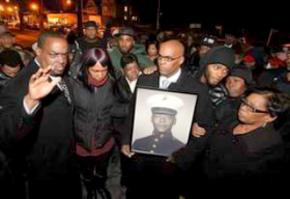Shot down in his own home
explains how police claims about the death of a Black veteran unraveled.
A GRAND jury will finally be convened to consider charges against police officers in the killing of Kenneth Chamberlain Sr., a 68-year-old former Marine and prison guard who was Tasered and then shot with bean bags and live bullets after cops burst into his apartment in White Plains, N.Y., outside New York City.
The killing took place almost half a year before, on November 19, but local officials and the media accepted the police version of events, which described Chamberlain as "emotionally disturbed" and claimed he had menaced officers with a butcher's knife and hatchet. According to the cops, officers were unable to subdue him with a Taser and four rounds from a beanbag gun, and only then did they shoot Chamberlain twice in the chest, fatally wounding him.
That might have been the end of the story had Kenneth Chamberlain's family not continued to demand answers and reach out to people willing to question the police narrative.
The story that has emerged in the past months paints a different picture--of a trigger-happy police force infected with racism and arrogance.

THE POLICE who arrived at the door of Chamberlain's apartment in a White Plains housing project at 5 a.m. weren't responding to reports of a crime in progress, but a possible medical problem. Chamberlain, who suffered from heart disease, wore a life alert pendant that he apparently set off the pendant in his sleep. When the medical monitoring company failed to get a response from him immediately, they notified police of a possible medical emergency.
A device in Chamberlain's home that the pendant transmitted to recorded what followed. The family was permitted to listen to the recordings, which is why we know that the police description of subsequent events were a lie.
When police arrived at his home, Chamberlain told them through a closed door that he was fine. The monitoring company also called police to tell them this was a false alarm, and to request that the call be cancelled. The police dispatcher responded, "We're not cancelling anything."
Police at the scene continued to demand entry, and refused to allow Chamberlain's niece, who lived upstairs in the same building, to speak to her uncle. According to the family, when Chamberlain said he was fine, an officer responded, "We don't give a fuck." An officer is heard referring to Chamberlain as "nigger" and making a mocking reference to his Marine service.
The cops claim that Chamberlain opened the door partially and held up a hatchet, which they say they took away from him. Videotape from a security camera shows police taking the front door off its hinges to gain entry.
At this point, the police say Chamberlain held up a butcher's knife at them. But family members and lawyers representing them say they have seen video footage from immediately after the door was opened, which shows "Chamberlain standing inside his apartment, wearing only boxer shorts, with his arms at his side and his hands empty," according to a New York Daily News report.
"The minute they got in the house, they didn't even give him one command," lawyer Mayo Bartlett, a former prosecutor in Westchester County, where White Plains is located, told the Daily News. "They never mentioned 'put your hands up.' They never told him to lay down on the bed. The first thing they did...you could see the Taser light up...and you could see it going directly toward him."
After this point, there is no video evidence of what happened in the final minutes of Chamberlain's life. But the questions are obvious. Even if the cops were threatened with a hatchet and knife, this doesn't explain why officers--knowing that they had received a false alarm about a medical emergency--were still determined to gain access to his apartment and why they refused to allow Chamberlain's niece to assist them in verifying that he was okay. Nor have the cops explained why they immediately used a Taser on an elderly man who they knew had a heart condition.
In the months since the incident, police have kept quiet about the case. Chamberlain's family and their lawyers have heard and seen the audio and video evidence, but police refuse to make the recordings public. And the cops have refused to identify the officer who shot Chamberlain. Given the initial zeal to discredit Chamberlain as an "emotionally disturbed," knife-wielding Black man, it's reasonable to ask whether the reluctance of the police to release any information is an attempt to cover up.
But the Chamberlain family's quest for justice is yielding results. A online petition demanding justice in the case has garnered more than 170,000 signatures, and Chamberlain's son, Kenneth Chamberlain Jr., has appeared on Democracy Now!
The growing scrutiny of the case has coincided with the national upsurge of protest against the racist murder of Trayon Martin by a self-appointed neighborhood watch captain--and, locally, with the outrage at the NYPD's murder of Ramarley Graham and other instances of police brutality in the Bronx.
This growing pressure explains why the Westchester County prosecutor convened a grand jury--and why White Plains Mayor Thomas Roach offered belated condolences to the family on behalf of the city. Roach endorsed the family's call for a full investigation, but stopped short of demanding that the recordings be made public or the identity of the officer who shot Chamberlain be revealed.
Prosecutors may have been forced to act by the growing pressure, but they can't be trusted to bring justice for Kenneth Chamberlain Sr. Opponents of police abuse and violence need to keep up the fight.


